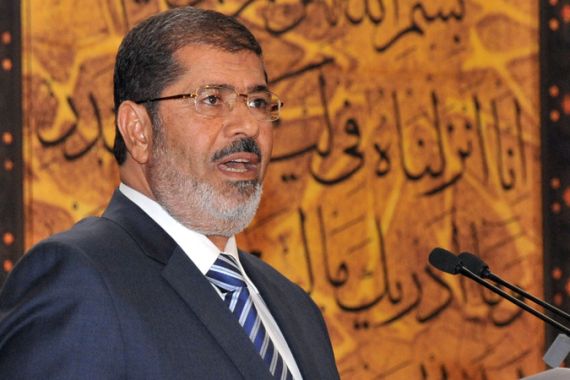Egypt TV chief denies inciting Morsi murder
Tawfiq Okasha tells court he merely criticised president and says trial against him is politically motivated.

An Egyptian television channel chief and presenter has denied calling for the murder of President Mohamed Morsi as his trial on incitement charges opened in the capital Cairo.
State news agency MENA said the prosecutor accused Tawfiq Okasha of using his TV programme in July and August to incite the killing of Morsi, and of insulting him by calling him an “illegitimate leader and a liar”.
“I merely criticised President Morsi,” Okasha told judges at the court appearance on Saturday.
“This is a political trial. The Muslim Brotherhood wants to silence all dissent and reproduce the system from before the revolution.”
Prosecutors said Okasha’s Al-Faraeen channel, which was suspended on August 16, aired a show that was stridently anti-Morsi and anti-Muslim Brotherhood, the party from which the leader emanates.
Okasha denied the charges and said it was part of a political row between him and the Brotherhood group.
He added that he was in the dock for “revealing the Brotherhood’s involvement in attacks on police stations, courts and prisons during the revolution” in 2011.
If convicted, Okasha could face three years in prison.
The judges postponed the trial to October 3, after hearing the case for the defence, which argued that the complaints against Okasha were not filed by Morsi personally.
Concerns
The charges against Okasha came at the same time that Islam Afifi, the editor of small independent newspaper Al-Dustour, was accused of spreading false news and inciting disorder.
Both Okasha and Afifi were banned from leaving the country in August.
Afifi was freed after spending several hours in custody on the day of his trial, after a decree signed by Morsi scrapped preventive detention for alleged publishing crimes.
Afifi was the first journalist to go on trial since the overthrow of veteran former President Hosni Mubarak in February last year.
After his inauguration on June 30, Morsi moved to bolster his power over the influential military and a state media that had been hostile towards his once banned but powerful movement.
The president got the Muslim Brotherhood-dominated upper house of parliament to name new editors-in-chief for state media that had been hostile to him and his bloc.
Morsi’s opponents accuse him of seeking to muzzle the press, and there has also been international concern.
US State Department spokeswoman Victoria Nuland said that the prosecutions of Okasha and Afifi ran counter to the spirit of last year’s revolution.